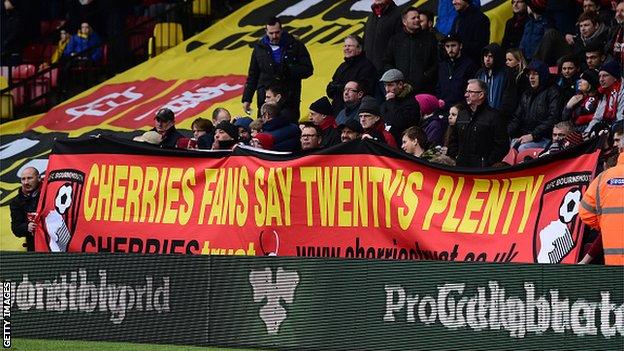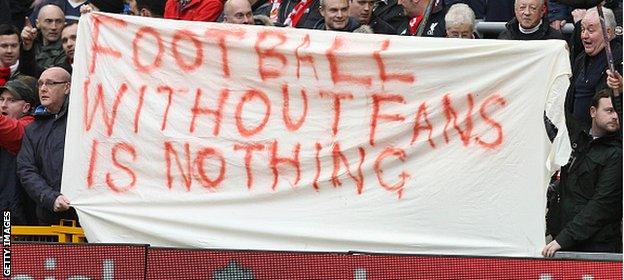Premier League to cap cost of tickets for away fans at £30
- Published
- comments

Bournemouth fans back the FSF's Twenty's Plenty campaign
Premier League clubs have agreed plans to cap away tickets at £30 for the next three seasons.
The cost of watching football has been a hot topic of debate, with supporters at Liverpool organising a high-profile protest over proposed increases in season ticket prices.
Now the top flight's 20 clubs have "unanimously agreed" that more should be done to help away fans.
The £30 away ticket cap will be introduced from next season.
In a statement, the Premier League said away fans were "essential for match atmosphere" and helped make the league unique.

Liverpool fans staged a walkout over ticket prices and won their battle with the club's owners
It also recognised that away fans often had travel costs to pay on top of the price of a match-day ticket.
Eight of 18 Premier League clubs who took part in the BBC's latest Price of Football study already offer away tickets for less than £30 for some matches.
But the study, published in October, also found that nine clubs charge more than £30 for their cheapest away ticket.
The change is likely to see travelling supporters paying more to watch second-tier football than top-flight games next season.
The Price of Football study found 13 clubs in the Championship charge £30 or more for their most expensive away tickets.
The new measures will replace the Away Supporters' Initiative.
This was introduced in 2013 and saw clubs individually implement a range of measures, including travel subsidies, reciprocal pricing and reduced admissions as well as improved facilities.
Does £30 reflect the wishes of the fans?
The Football Supporters' Federation (FSF) has long campaigned for cheaper tickets and wanted prices for away fans capped at £20.
FSF chief executive Kevin Miles said his organisation was "very pleased the voice of fans has been listened to".
But Labour's shadow Minister for Sport Clive Efford said the £30 cap is "still £10 above the level that fans have called for".
Liverpool fans group Spirit of Shankly, who helped to successfully lead protests against a proposed price increase at Anfield earlier this season, said the away ticket cap was "a very good step in the right direction".
Spokesperson James McKenna credited the Premier League's new £5bn television deal, which starts next season, as the driver for the cap.
"We have been saying the price of away tickets was too much and this new TV deal presented them with an opportunity to lower them," he said.
What football is costing you |
|---|
What are clubs saying?
Premier League tickets: 30 pound away cap 'good for football'
Everton chief executive Robert Elstone said the move was "absolutely right for away fans and for the Premier League".
He added: "Most clubs have recognised for some time that we need to do something for the travelling supporter."
Stoke chief executive Tony Scholes said he was delighted with the initiative because "away supporters "pay a disproportionately high cost to follow their team".
The away ticket price cap was announced on the same day Arsenal and Tottenham revealed ticket price freezes for home fans.
The Gunners will also provide a further £4 discount for its away supporters attending Premier League matches in addition to the £30 cap.
Most expensive single away match tickets in Premier League (2015-16 season) |
|---|
West Ham £85 |
Arsenal £64 |
Chelsea £59 |
Manchester City £58 |
Tottenham £54 |
Everton £48 |
Source: Price of Football study 2015 |
*Cheapest away tickets offered by clubs above: West Ham £25, Arsenal £26, Chelsea £47, Manchester City £42, Tottenham £32, Everton £36 |
*Manchester United did not supply information; Swansea did not take part in study |
Spotlight on the Championship?
A Football League spokesman said the issue of ticket pricing was "a matter for individual clubs".
It also pointed out that ticket revenue forms a far greater proportion of turnover for Football League clubs than it does for Premier League ones.
"Overall, our clubs offer excellent value for money with the very best value being reserved for those supporters committing to a season ticket," said the spokesman.
"Nevertheless, today's decision will give our clubs something to consider given that they are in a competitive market for spectators and therefore must be able to offer value for money."
- Published20 June 2016

- Published7 June 2019

- Published2 November 2018
